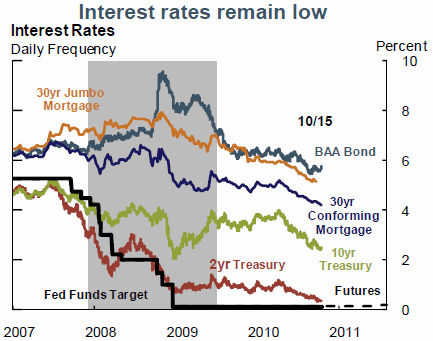Matthew Yglesias's Blog, page 2525
October 19, 2010
Socialist Cities
Urban real estate isn't a "free market" anyplace that I'm familiar with, but market forces are an important factor in most urban real estate markets. Consequently, you tend to get taller buildings near the center where land is most expensive, and lower-density construction on less-valuable land that's further away. For much of the twentieth century, however, many countries engaged in a big-time experiment in doing construction in a totally non-market way which apparently lead to a distinctive pattern of urban growth, as explained by Alain Bertaud and Bertrand Renaud in "Socialist Cities without Land Markets" (that's via Stephen Smith):
How does the spatial dynamics of the socialist city compare with that of the market city? What happens when all investment decisions are made administratively in the absence of land markets? Russian development is the longest socialist experiment on record. Its outcome is of paramount interest to urban economists. This paper reports the first analysis of the structure of Russian cities after 70 years of Soviet development. The main finding is a perversely positive population density gradient. The Soviet city also has a disproportionate share of industrial land, often in prime locations. Free property trading started in Russia in 1992. The emerging negative price gradient contrasts totally with the positive population gradient that is the legacy of administrative land allocation. These two conflicting gradients highlight the land misallocation and inefficiency of the socialist city.
Here's a chart illustrating the contrast between Paris and Moscow:
Given the way tea partiers are throwing the term "socialism" around to mean any kind of provision of social welfare it's worth being clear here that the issue isn't high taxes on the rich to finance to finance rent subsidies. The issue is that instead of land being allocated according to who had the means and inclination to pay for it, it was allocated by political insiders to whatever they preferred.


Trident Replacement is Bad News for the USA
British defense spending should be every American's favorite kind of defense spending. UK military assets are essentially at the disposal of US foreign policy, but American taxpayers don't need to foot the bill. So we should all pay attention to the defense cuts coming as part of David Cameron's austerity drive:
David Cameron has confirmed defence spending is to be cut by 8% in real terms over four years, as he unveils the strategic defence review. He said RAF and Navy numbers would be reduced by 5,000 each, Army numbers by 7,000 and the Ministry of Defence would lose 25,000 civilian staff by 2015. [...]
Mr Cameron vowed to push ahead with replacing Britain's Trident nuclear missile system but said their replacement would be scaled back, with the number of warheads per boat cut from 58 to 40, as part of a £750m package of savings.
Cutting conventional military personnel while spending money on renewing Britain's nuclear arsenal is more-or-less the worst case scenario from an American perspective. The UK's ability to contribute to the "global public goods" functions of the Pentagon will be diminished more than is necessary to meet the monetary targets, and British possession of a nuclear second-strike capability accomplishes nothing whatsoever for America. What's more, it doesn't really accomplish anything for the United Kingdom either—it's just a way of hanging on to a bit of faded imperial glory.
What's more, I think it's worth paying some attention to the role the small British and French nuclear arsenals play in the larger global proliferation question. What message does it send to Brazil, Taiwan, South Africa, Indonesia, and other regional powers when medium-sized countries facing no conventional security threat and benefitting from explicit American security guarantees insist that they need nuclear arsenals? And how much does desire to keep the door to nuclearization open play into their stances on questions relating to "bad guy" proliferators like Iran and North Korea? The obligation of existing weapons states to take meaningful steps toward nuclear disarmament falls primarily on the US and Russia, which have the bulk of the weapons, but the smaller arsenals play a role in this as well.


Cuba Embargo Turns 50
Ian Vasquez observes that this is the fiftieth anniversary of America's ridiculous embargo of Cuba:
It is time to lift the embargo. Doing so will not save communism from its inherent flaws; that system collapsed spectacularly elsewhere around the world in places where the West maintained or established trade. Keeping the sanctions will only further allow the dictatorship and its sympathizers to explain away the regime's own failings. It would be better for Cubans and the world to see the unraveling of Cuban communism without U.S. intervention. When a free Cuba is eventually born, it will more easily flourish if enemies of the open society cannot rely on a false narrative about how the colossus of the North finally killed off the island's socialist experiment.
A good way to start would be by lifting the travel portion of the embargo. That measure would expose ordinary Cubans to hundreds of thousands of American citizens, thus inevitably expanding Cuba's informal economy and establishing innumerable relationships that would make Cuban citizens more independent of the state. The regime may try to reap the benefits of increased revenues, but it will have unleashed a social dynamic that will be difficult to control.
To add a few other points, Cuba aside it's simply preposterous for the government of a democracy to be restricting which countries its own citizens are allowed to visit. What's more, it's worth emphasizing that insofar as a relaxed embargo would present new economic opportunities to the Cuban regime the way for them to maximize those opportunities is to walk further down the China/Vietnam path and relax their grip on the economy. Consequently, the impact of relaxing the embargo on Cuban freedom is necessarily going to lie somewhere in the positive range.


Real Interest Rates
Mark Thoma posts a detailed presentation from Mary Daly of the San Francisco Fed about the bleak economic outlook. I'd like to just pull a couple of charts out.
First this one:
Second, this one:
If you look at just the first chart, it looks like rates on things like Baa corporate debt and jumbo mortgages have returned to pre-crisis levels. But when you put the first chart in the context of the second chart, you'll see that falling inflation and inflation expectations mean that real rates are higher than they might initially appear. Take that as a token example of how room remains for Fed actions to help restore the economic equilibrium.


What If Anthony Kennedy Decides He Doesn't Like The Affordable Care Act?
Jonathan Bernstein asks:
How scared are you about the possibility that the Supreme Court will (1) knock out ACA, and (2) return to pre-New Deal interpretations of the powers of the federal government?
And, the big question: should that happen, what kinds of political consequences would you expect?
I think it's important to be clear on what we're talking about exactly. If for some reason Anthony Kennedy decides he wants to rule that the government can't levy a tax on people who decline to obtain Affordable Care Act-compliant insurance plans then that needn't actually be a big deal. The existing tax penalty for non-insurance is thought by many observers to be too low to really make the regulate/mandate/subsidize framework work so it's likely that congress will need to revisit this point anyway. And if Justice Kennedy says congress can't incentivize insurance purchasing through this channel, congress can instead raise taxes on everyone and then immediately return the tax in the form of a "health care voucher." Nobody will be mandated to use the voucher on an ACA-compliant insurance plan, but as the voucher will be non-transferrable and generally worthless for any other purpose the incentive will be created.
In general, I'm not really sure what a "return to pre-New Deal interpretations of the powers of the federal government" would entail. I assume it would continue to permit wide congressional discretion in enacting tax and transfer programs (see, e.g., the history of Civil War pensions) and I think it's generally possible to translate just about any proposed regulation into a form of tax-and-transfer scheme.
But I'm not sure that this kind of law-talk is the right way to understand the issue. Just as norms have evolved from a situation in which it normally requires 50 Senators to pass a bill and filibusters are extraordinary, it's possible that we'll shift from a situation in which the Supreme Court only rarely strikes down social policy legislation it doesn't like on the merits to one in which only bills that at least five Justices support can become law. Insofar as Justice Kennedy's hypothetical purpose in striking down ACA provisions would be to prevent the whole thing from working, it'd be easy enough for him to make that happen.


Global Economic Impact of Immigration
If we passed a law saying it's illegal for people born in New York to move to California or vice versa, that would make most New Yorkers worse off. It would also make most Californians worse off. But importantly, the negative impact of introducing that kind of inefficiency into the labor market would be felt even more widely as the newly impoverished versions of New York and California would have a generally deleterious impact on the national economy.
This is all by way of introducing Gordon Hanson's paper (via Chris Blattman):
The typical individual who migrates from a poor developing country to the United States sees an increase in income by a factor of four, largely as a result of the immense international differences in labor productivity that exist in the world today. As an illustrative example, I estimate that migration from Mexico to the United States raises global income by an amount equivalent to roughly one percent of US GDP.
Many people purport to be saddened by the fact that so many people live in countries that are poor, tyrannical, or otherwise malgoverned. And rightly so. But relatively few seem willing to acknowledge that one of the simplest and most effective means at our disposal for addressing these concerns is to make it easier for the residents of such countries to move to richer and better-governed places.


Never Resign
Reviewing Client 9, Felix Salmon speculates that "[m]aybe Spitzer's problem was that he was never very good at cultivating powerful friends who could protect and support him — a skill that another executive horndog, Bill Clinton, has in spades."
I think the contrasting fates of Spitzer and guys like Clinton or Senator David Vitter (R-LA) shows that Spitzer's problem was much simpler than that—he resigned. When a reasonably popular public official is hit with a scandal of a personal nature, the natural immediate first reaction of his same-party colleagues is to want to get rid of him. After all, no reason this guy should be a millstone around all of our necks. That leads to an initial torrent of criticism from friendly-ish sources and a wave of pressure to resign. But if you resist that first wave, apologizing for your conduct but refusing to apologize for your years of public service and highlighting the pernicious special interests who'd love to see you brought low, you basically flip the dynamic. Now you're definitely going to be a millstone around everyone's necks so the question becomes how heavy a stone?
Suddenly all your same-party colleagues have an incentive to defend you and to attack your enemies. Suddenly an incumbent Republican in Louisiana is just another guy with a safe seat. An incumbent President presiding over an economic boom is super-popular. And I bet an incumbent Democratic governor in New York could have cruised to re-election.
After all, at this point Spitzer is basically rehabilitated in all the ways that count. His new primetime TV show may or may not succeed, but that will turn on his merits as a TV commentator. It's not going to fail because people can't "forgive" him or whatever. And by the same token, were he still governor he'd be struggling with the economic problems afflicting incumbent politicians everywhere but fundamentally he'd be getting judged on the same basic criteria as everyone else. It's different for a mere candidate (like John Edwards, say) but my advice to any incumbent with a reasonably strong political position who's suddenly wracked by a sex scandal is simple—don't quit. And make it clear to all your political allies that you're not going to quit, so they'd better all start thinking about how to rally around you.


Point/Counterpoint: What Are Gentiles For?
Rabbi Ovadia Yosef, head of the Shas' party's Council of Torah Sages, offers one idea:
"Goyim were born only to serve us. Without that, they have no place in the world – only to serve the People of Israel," he said in his weekly Saturday night sermon on the laws regarding the actions non-Jews are permitted to perform on Shabbat.
As a counterpoint, I offer John Kay of Steppenwolf who maintains that he was born to be wild:
Apparently when Kay was a baby he was part of the evacuation of East Prussia.


Pharma's Doctors for Hire

(cc photo by rodrigo senna)
Charles Ornstein, Tracy Weber, and Dan Nguyen have an excellent ProPublica feature out today examining the conflict-of-interest ridden nexus of pharmaceutical company marketing and medical doctors. In particular, it looks like a lot of pharma's favorite speakers aren't exactly the best and the brightest:
Drug companies say they hire the most-respected doctors in their fields for the critical task of teaching about the benefits and risks of their drugs.
But an investigation by ProPublica uncovered hundreds of doctors on company payrolls who had been accused of professional misconduct, were disciplined by state boards or lacked credentials as researchers or specialists.
This story is the first of several planned by ProPublica examining the high-stakes pursuit of the nation's physicians and their prescription pads. The implications are great for patients, who in the past have been exposed to such heavily marketed drugs as the painkiller Bextra and the diabetes drug Avandia — billion-dollar blockbusters until dangerous side effects emerged.
"Without question the public should care," said Dr. Joseph Ross, an assistant professor of medicine at Yale School of Medicine who has written about the industry's influence on physicians. "You would never want your kid learning from a bad teacher. Why would you want your doctor learning from a bad doctor, someone who hasn't displayed good judgment in the past?"
To take this in a new media direction rather than a health care direction, the need for someone to undertake projects like this is why it's important for at least some philanthropic effort to be dedicated to ventures like ProPublica that aren't working on the minute-to-minute news cycle. The good news is that thanks to digital technology the funds that were invested in the reporting of this feature have a dramatically higher payoff than they otherwise would have.
For one thing, people all over the country—all over the world, in fact—now have the opportunity to read it rather than the audience being restricted to one metropolitan area. For another thing, the research at the core of the article isn't sitting around in a filing cabinet somewhere—ProPublica's created an online searchable and sortable database that will be useful to the public and to other researchers and reporters. Last and probably most important, people who don't read this story today will be able to find it tomorrow and next week and next month and even next year. Lots of important journalism isn't really about "the news" in the sense of "stuff that happened yesterday" and the Internet makes it much more viable to put things out there that kind of float independently of specific timing.


Phony Counterinsurgency Is Dead
One book I find myself thinking about a surprising amount is Phony Communism is Dead . . . Long Live Real Communism by Revolutionary Communist Party Chairman Bob Avakian, originally published in 1992. Not because I spend a ton of time thinking about Communism per se, but because arguments in the style of its title are surprisingly frequent.
In particular, in recent American national security policy we've seen an awful lot of energy go into arguments about why we don't have to rethink our strategic concepts. This is what the incompetence dodge argument on Iraq was about, and as Joshua Foust argues we're starting to see a version of it emerge with regard to "counterinsurgency" in Afghanistan:
A fascinating undercurrent to this discussion is the descent of counterinsurgency as an unstoppable force for the betterment of war to a troubled theory we haven't really figured out how to do right, if ever. Many of the boosters of COIN, who see the McChrystal implementation literally blowing up in our faces, seem eager to cast what is wrong with the war on refusing to follow the theory, rather than the theory's inherent unworkability.
I think that's about right. That's not to say that actual practice in Afghanistan over the past two years has been 100 percent perfect implementation of counterinsurgency theory. But you can't initiate a large complicated undertaking that involves coordinated action by hundreds of thousands of individual human beings and then make success contingent on perfect implementation.


Matthew Yglesias's Blog
- Matthew Yglesias's profile
- 72 followers












